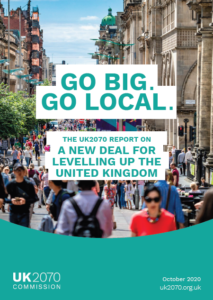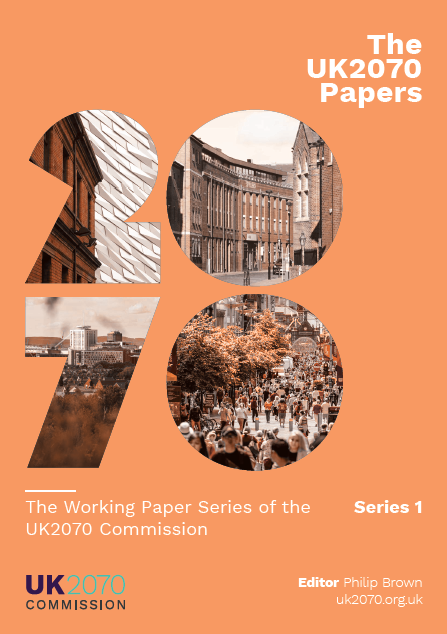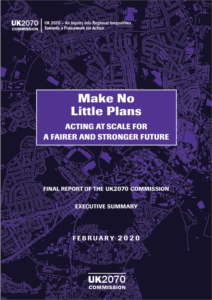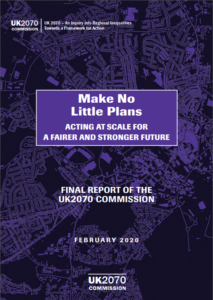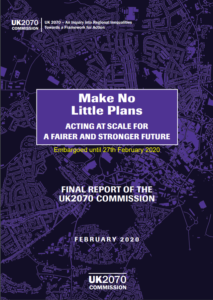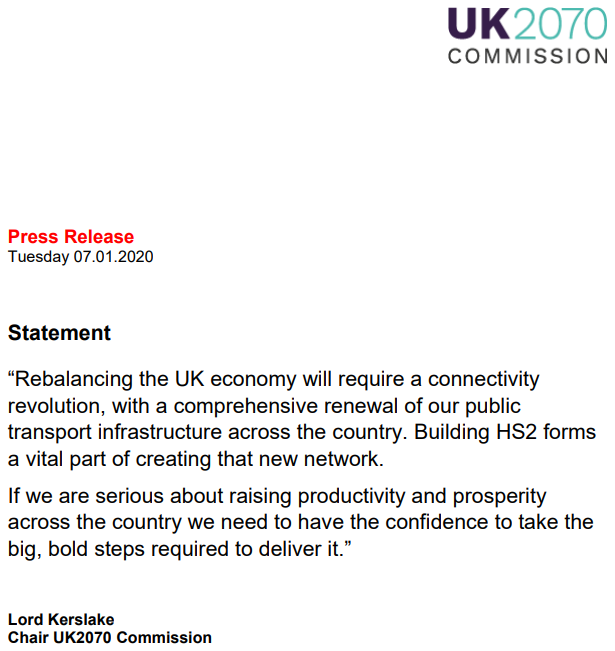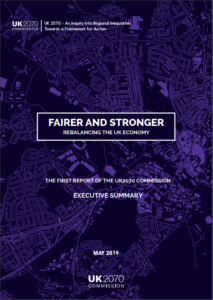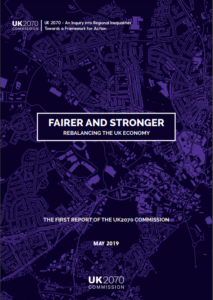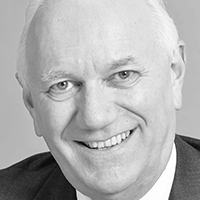The UK2070 Commission, which is chaired by the former head of the Civil Service, Lord Kerslake, says deep-rooted economic divides across the UK will worsen unless government addresses strategic failings in regional policy which stretch back 50 years. The Commission reported earlier this year that London’s global success was contrasted elsewhere in the UK with some of the worst inequalities in Europe, with stop-start regional policy failing to tackle problems that have led to economic under-performance and lower healthy life expectancy.
Our Second Report says government must urgently develop a long-term vision for the UK which decisively addresses deprivation, unlocks regional economic potential and confronts the challenges presented by climate change and new technologies. It identifies seven national priorities for action which we believe are vital if worsening performance and widening divisions between different parts of the UK are to be avoided.
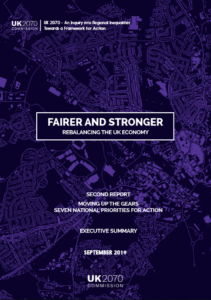
Click here to read the Executive Summary
Lord Kerslake warned: “Time is not on our side. Successive governments have spent the last 50 years trying to rebalance the UK economy and create a fairer and stronger nation. Those efforts have failed and the hard evidence uncovered by our inquiry shows that we remain one of the most unequal and divided nations in Europe. If we continue our current approach those divisions will worsen, potentially to a serious degree. We need to adopt a strategy that allows London to sustain its global role whilst at the same time targeting some systematic firepower at raising the economic performance of regional Britain. The research and consultation carried out by the UK2070 Commission across the country has identified both where we can make progress and the actions needed to deliver it. It will not be sufficient to tinker with existing policies or make incremental changes to budgets – the system itself is consistently failing to deliver effective solutions.”
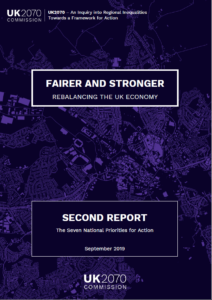
Click the image above to read the Full Report
In our Second Report, entitled ‘Moving Up The Gears’, the UK2070 Commission has made a series of detailed recommendations intended to rebalance the UK economy whilst sustaining the performance of London and the South East. Those recommendations are in summary:
1] Climate Change: protect disadvantaged communities who are most at risk from its impact and use the market opportunities created by a move to a carbon zero economy to rebalance our economic geography.
2] Deliver a 20-year connectivity revolution: commit to renewing and extending out-dated transport infrastructure so that it reflects the present economy rather than the past; reconnect marginalised communities and shift towards shared transport and new technologies.
3] Create a global centre of excellence in industrial digital technologies: bring Britain’s leading regional universities together to power-up technologies that have the capacity to create 20,000 businesses, increase economic value by £1.2bn a year and upskill a million industrial workers.
4] Strengthen the foundations of local economies: provide higher quality advice for SMEs delivering local, everyday services; put refocused Further Education at the heart of a refreshed skills agenda; introduce universal standards to ensure adequate local services, particularly in marginalised communities.
5] Accelerate devolution: devolve decisions about regional economies to all regions, not just those with government-sanctioned deals; introduce Parliamentary Committees and Cabinet positions which recognise and respond to the Powerhouses of the North, Midlands, South West and South East.
6] A plan for England: introduce a spatial plan for England setting out explicit, funded priorities for coordinated, connected development which supports the UK’s global role whilst addressing regional inequalities.
7] Level the playing field for funding: on top of a £250bn UK Renewal Fund outlined in the Commission’s First Report, introduce a regional investment bank network; change Treasury investment rules so that they accommodate regional variations and help rebalance the economy according to the long-term vision.
Lord Kerslake said: “Our initial report highlighted the stop-start nature of regional policies, the inadequate resources underpinning them, and an over-centralised governance that fails to comprehend regional need and has an inherent bias towards only funding areas which are already successful. Regardless of the impact of Brexit, we have gone way beyond the point where simple policy change is the appropriate response. We need a new model for delivering regional policy, one armed with the right resources and the right tools and working towards a long-term goal. One of the most striking aspects of the way the UK is governed is that while it has policies aplenty, there is no clear, guiding vision for the future of the nation in the decades to come. We are also taking too many operational decisions centrally and in doing so failing to respond to the fine-grain of local need. The question is not how we pay for all this, but whether we’re willing to accept the continuing cost of not doing so – a cost which will be measured not only in the persistent economic under-performance of the UK but in damaged lives and deprived communities.”
Lord Kerslake said that whilst London’s global success was a contrast to other parts of the UK, it was critical that the capital’s performance was made more sustainable.
“The correct response is not North versus South, but a coordinated strategy which ensures London does not overheat and that our regional economies grow and gather momentum. This can be a united vision for the future, but we start by recognising that there is significant ground to make up in the English regions, even those with vibrant cities. The Power up the North campaign which followed the publication of our First Report is a reflection of great ambition and untapped potential. But there are parts of regional Britain where the lives people lead and the fabric of the world around them is disturbingly deprived. No government with a meaningful vision for the UK’s future can afford for that to continue. The Power Up the North campaign pointed to a real appetite for progress and the need for a more effective way of unlocking that potential. Too many decisions about the regions are being taken in Whitehall when more progress would be made by regionally-owned solutions.”
Lord Kerslake concluded: “The UK’s inequalities have persisted for too long and government must start moving up the gears – first, by acknowledging that these inequalities are not a policy challenge but a strategic threat; second, by accepting that they are too complex and localised to be solved in Whitehall alone. Finally, this has to be a long-term commitment which acts as a commonly agreed guiding light. This amounts to a leadership test for whoever is in government in the decades to come. It will define the Britain of the future.”
 The Right Honourable The Lord Kerslake
The Right Honourable The Lord Kerslake
